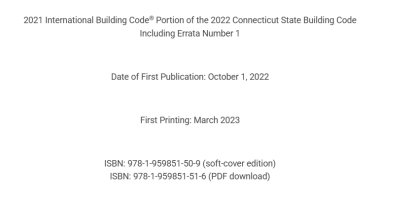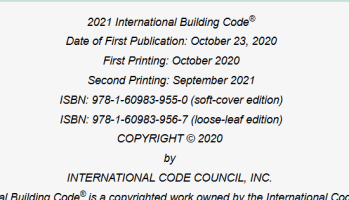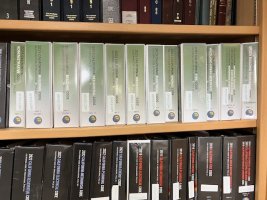jar546
CBO
All of that, and you are still wrong. How can that be?No.
I am intimately familiar with the code adoption process in Connecticut. I was a founding member and I am a former chair of the AIA Connecticut Building Codes and Regulations Commission. I follow the code adoption process closely. You are citing a code reference to the statute that basically says the Codes and Standards Committee (of the State, not the AIA Commission) shall adopt a code, yada, yada. What you are overlooking is that the adoption of a new code by the Codes and Standards Committee cannot proceed until the legislature has reviewed and approved the codes proposed for adoption -- with all amendments (Connecticut or ICC). Once approved, the code IS locked in time, unless and until Codes and Standards goes through a formal revision process and has the further amendments blessed by the Legislative Review Committee.
The official version of the IBC portion of the 2022 Connecticut State Building Code specifically includes Erratum No. 1 -- no other errata are in force in Connecticut.
View attachment 16183
The State Building Inspector periodically warns us about NOT using unauthorized code sources (such as UpCodes) or any other sources for code language when citing violations, because if there is any difference between an outside source and the official, printed Connecticut version -- the official version prevails. Going into court using any other source is likely to result in embarrassment. My former employer and I ran into this a number of years ago when researching a code issue. We came up with two versions of the same code section. Turned out that one of us had the first printing and one of us had the second (or third?) printing, and that section had been changed ("corrected"). Digging deeper, we found that the first printing was what had been approved by the Legislative Review Committee, so that was what we had to cite.
No errata have any force in Connecticut unless and until formally adopted by the Codes and Standards Committee, with approval from the Legislative Review Committee.
The online version has the errata already implemented. Yes, the date of first publication was October 1, 2022, and the first printing was March of 2023, but the Errata was issued on April 12, 2023; therefore, if you purchased the first printing, the changes in the errata (and there were a lot) were not included until the following month. So you could print the errata and keep it with you, and then try to read the differences, OR you could use the online version, which is always updated and includes the errata. So, according to your post that got me interested in replying, you said they adopted a specific printing and that was it; however, that is not how it was adopted, which I proved with the language from the statute. If you were right, then the errata would not be allowed to be recognized the way you are saying it. Go back to my original response to you.
So which one is it? Did they adopt only the text as first published or printed, or can the errata be allowed to change the code? You can't have it both ways.



